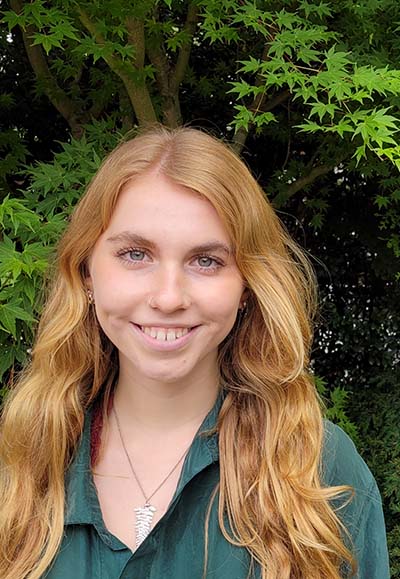SUNY ESF
Isabella DeAnglis '22
As a high school student, Isabella DeAnglis '22 knew she wanted to study wildlife in college. She also knew her family faced the challenge of supporting not only her education but also that of a sibling whose college career would overlap with hers.
ESF offered the solution to both challenges.

"I always knew I wanted to work with wildlife, particularly in research and conservation. When I learned about ESF, I was really excited to have not only a community that was like-minded, but an opportunity to get involved in research as an undergraduate as well," she said.
Then the New Jersey native found out she had been awarded a National Scholarship, which is earmarked for out-of-state students, and the Arthur N. Ashley '53 Endowed Scholarship, which was established by Ashley's estate to provide scholarship support to deserving students.
"It really helped my family afford the out-of-state tuition and put my sister and me through college at the same time," DeAnglis said. "I'm so grateful for the scholarship help."
DeAnglis is studying conservation biology and managing a double minor in applied statistics and environmental writing and rhetoric. She is now focusing on her honors thesis, researching how neotropical bats' diets affect how their immune systems are altered by habitat fragmentation.
"I'm looking at fruit-, nectar-, insect- and blood-eating bats to see if they react differently," she said. "For example, fruit eating bats might be affected by deforestation to a greater extent as compared to blood-eating bats, who can feed on cattle when forested land is converted to agricultural fields."
She has been working in the lab of Dr. Cynthia Downs, an ecological physiologist who teaches Animal Physiology And Animal Behavior, since her sophomore year conducting white blood cell counts categorizing the various type of cells. The bat blood and DNA were collected by researchers from another institution during fieldwork in Belize. ESF is contributing to the lab analysis.
In addition to her studies, DeAnglis' activities at ESF have included serving as a teaching assistant for a biology lab and working as a field technician at ESF's Thousand Islands Biological Station (TIBS). She has been a member of AXS honor society, the Conservation Biology Club, The Wildlife Society and the National Society of Leadership and Success.
She said her summer at TIBS was particularly memorable. "I really enjoyed that experience. I lived on the island in the St. Lawrence River all summer, helping with research into northern pike and muskellunge populations. We netted fish for the first half of summer then explored the tributaries looking for the young fish to see how they were doing."
Her goal is to continue her education in graduate school in preparation for a career as a wildlife conservation field biologist.
"I have made lifelong friends and have really enjoyed my experience at ESF," she said. "ESF stood out because it gives students the opportunity to pursue research during their undergraduate years. Students at other schools don't always have the opportunity to do that so early on."
